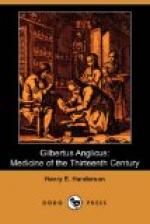[Footnote 5: Haeser says that this MS. of Roger’s “Chirurgia,” made by Guido Arenitensium, was discovered by Puccinoti in the Magliabechian library, and that an old Italian translation of the same work is also found there. The latter was the work of a certain Bartollomeo.
The text used to represent Roger in the present paper is that published by De Renzi (Collectio Salernitana, tom. II, pp. 426-493) and entitled “Rogerii, Medici Celeberrimi Chirurgia.” It is really the text published originally in the “Collectio Chirurgica Veneta” of 1546, of which the preface says:
“His acceserunt Rogerii ac Guil. Saliceti chirurgiae, quarum prior quibusdam decorata adnotationibus nunc primum in lucem exit, etc.,” and adds further on:
“Addidimus etiam quasdam in Rogerium veluti explanationes, in antiquissimo codice inventas, et ab ipso fortasse Rolando factas.” While I may recognize gratefully the surgical enthusiasm which led the editor to the publication of these “veluti explanationes,” for my present purpose he would have earned more grateful recognition if he had left them unprinted. As the text now stands it is merely a garbled edition of the Rolandina. However, it is the best representative of the “Chirurgia” of Roger at present available. See De Renzi, op. cit., p. 425.]
From a careful review of the data thus presented we may epitomize, somewhat conjecturally, the life of Gilbert substantially as follows: He was probably born about 1180 and received his early education in England. On the completion of this education, about the close of the 12th century, he proceeded to the Continent to complete his studies, and spent some time in the school of Salernum, where it is probable that he enjoyed the instruction of Roger of Parma, Ricardus Salernitanus, and may have had among his fellow-students Aegidius of Corbeil. Probably after his return to England he served for a brief period on the staff of Archbishop Hubert Walter, after whose death in 1205, but at an unknown period, Gilbert returned once more to the Continent, where it seems probable he spent the remainder of his life. This comports best with his extensive European reputation, his surname “Anglicus” and the comparative dearth in England of any facts relating to his life. The date of the Compendium I am inclined to place about 1240, prior to the literary activity of Ricardus Parisiensis or Richard of Wendover, Roland of Parma, Roger Bacon and Theodorius of Cervia. We may place his death, conjecturally, at about 1250.




